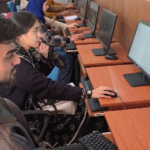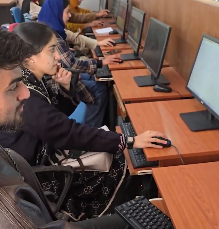SRINAGAR, July 22 – Often hailed as “Paradise on Earth,” Kashmir is not only celebrated for its mesmerizing landscapes but also for its centuries-old handicraft traditions. From delicate Pashmina shawls to intricate walnut wood carvings, the valley’s artisans have nurtured a rich cultural heritage that continues to captivate global markets.
More than just a symbol of tradition, the handicraft sector is a vital pillar of Jammu and Kashmir’s economy. Supporting over 3.5 lakh artisans and generating an estimated ₹2,100 crore annually, the industry is a powerful source of employment—especially in rural and socio-economically disadvantaged communities.
Types of Kashmiri Handicraft Jobs
The sector offers a diverse range of opportunities, including:
1. Artisan Roles
- Shawl Weaving: Especially in Srinagar and Budgam, artisans skilled in traditional looms are in high demand for Pashmina and Shahtoosh weaving.
- Carpet Weaving: Kashmiri carpets with intricate knotting techniques are prized globally.
- Walnut Wood Carving: Artisans craft everything from furniture to decorative items with growing export demand.
- Papier-Mâché & Embroidery: Popular among creative individuals for home décor and apparel design.
2. Training & Skill Development
- Vocational centers run by the Department of Handicrafts, Budgam train aspiring artisans. Trainers, particularly in rural areas, play a key role in preserving these skills.
3. Marketing & Sales
- Artisans now participate in exhibitions across India, with increasing scope in e-commerce and export management roles.
4. NGO & Cooperative Opportunities
- NGOs such as the Kashmir Humanity Foundation (KHF India) offer training and jobs in outreach, logistics, and community coordination.
Government & NGO Initiatives Empowering Artisans
Several targeted programs are boosting job creation and sustainability in the handicraft sector:
- Artisan Credit Card Scheme: Backed by the Indian Banks Association, this initiative provides easy loans and insurance to registered artisans. Apply via JKGSS.
- Self-Employment Credit Plan: Aimed at artisans from economically weaker sections, this program funds new ventures and promotes independence.
- PMKVY Upskilling Programs: Under Recognition of Prior Learning (RPL), artisans are trained in modern skills and certified for better employability.
- NGO Support: KHF India and others offer digital literacy, tailoring, and computer training, along with assistance in accessing government schemes. Contact: admin@jkhfindia.org
Success Stories from the Valley
Rukhsana: A Weaver of Dreams
A 28-year-old from Srinagar, Rukhsana completed her training at a Budgam center and used an Artisan Credit Card loan to launch a workshop. Now employing three other women, she sells shawls online and in Delhi exhibitions. “Training gave me confidence. The loan helped me become independent,” she shares.
Bilal: A Carver Turned Exporter
Bilal, 35, from Anantnag, joined a government-supported cooperative. With modern design training and direct buyer access, he expanded his walnut wood carving business globally. “Eliminating middlemen changed everything,” says Bilal.
How to Find Handicraft Jobs in Kashmir
1. Register with Employment Exchanges
Sign up at District Employment & Counselling Centres or online via services.india.gov.in.
2. Explore Schemes
Stay updated with benefits under JKGSS, including credit and insurance schemes for artisans.
3. Join Training Programs
Enroll through the Department of Handicrafts, Budgam or NGOs like CHINAR Kashmir.
4. Network with Cooperatives
The Directorate supports artisan cooperatives that connect workers to broader markets.
5. Use Job Portals
Platforms like jkadworld.com and naukri.com list current openings in the handicraft sector.
Challenges and the Road Ahead
While the sector shows promise, artisans still struggle with technological barriers, inconsistent work, and limited global reach. However, the rise of digital training, e-commerce platforms, and global demand for sustainable goods offer new opportunities for growth and innovation.
Tips for Aspiring Artisans
- Upskill Continuously: Attend workshops and modern design training sessions.
- Go Digital: Use social media like Instagram to promote your products.
- Use Government Schemes: Apply for credit or insurance benefits to start your journey.
- Join Cooperatives: Pool resources and access larger markets collectively.
Conclusion
Kashmiri handicraft jobs are more than just work—they are a celebration of cultural legacy and economic resilience. With growing support from the government, NGOs, and digital platforms, artisans now have the tools to thrive in a competitive global market. Whether you’re a traditional craftsman or a new learner, the path to a rewarding career in handicrafts begins with training, networking, and the courage to craft your own future.










